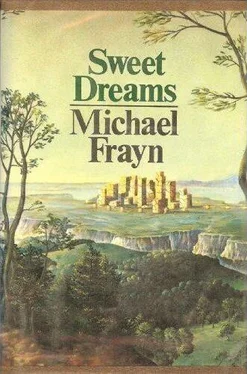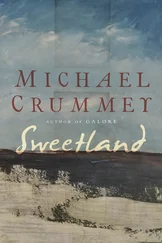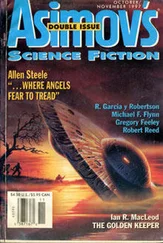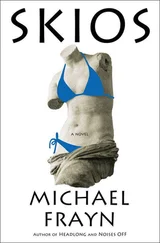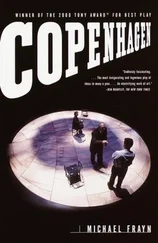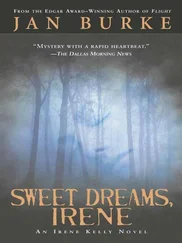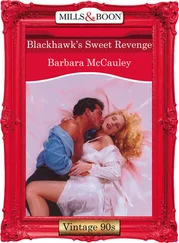“How do you mean?” he says.
“Oh,” says Miriam, “Jack met some rather hairy young man at a party, that’s all.“
“He told me that half the bacteria I’m developing are lethal,” says Jack. “Going to kill people off like flies.”
“No!” cries Felicity.
“Yes!” squeaks Miriam. “He said Jack was just part of the system!”
“System?” demands Howard, looking from one to the other, not understanding any of this. “What system?”
“Don’t you know?” says Miriam dramatically. “We’re all together in a gigantic conspiracy to dominate the world!”
Howard looks round the room, half-believing for a moment that the game he and Phil used to play might be coming to life after all. But at the sight of all those senior conspirators standing uncomfortably around in rented tailcoats he can’t help laughing.
“The whole set-up’s a joke!” he whispers.
“It’s an awfully long joke,” says Miriam. “What I want to know is where God’s supposed to be.”
They thread their way among the morning suits, looking. There’s a crush over by the door in one of the rooms, with flashbulbs going off every few seconds, but it’s impossible to get near enough to see.
“I’ve half a mind to take off, and have a look from the ceiling,” whispers Howard.
“Go on, then,” urges Miriam.
“We ought to,” says Jack. “What’s the use of being able to fly if you never use it?”
“Up you go,” says Felicity.
They hesitate.
“Supposing everyone started doing it?” says Howard.
“I’d do it if I were younger,” says Jack.
“Oh, so would I. Like a shot.”
“I wouldn’t give a damn what anyone thought.”
“Jack’s put on ten years specially,” explains Miriam.
“So’s Howard,” says Felicity. “But they could be eighteen for a few moments. No one would notice.”
Howard and Jack look at each other.
“I’d feel a fool, frankly, being eighteen in a morning suit,” says Jack.
So they never see God at all.
“Well?” Bill Goody asks Howard at the Chases’ next day. “What was he like? Irresistible, was he? Called you Howard and knew all about the Matterhorn?”
“We never saw him,” says Howard.
The remark is a great success. Everyone laughs and bangs on the table.
“Only Howard Baker could manage to be in the same room as God and not to notice him!” cries Rayner Keat.
“The Bernsteins didn’t see him either!” protests Howard.
But on second thoughts he erases the remark, and replaces it with a slight smile.
“You didn’t see God?” cries Phil Schaffer in exasperation, when Howard smilingly repeats his successful remark to him. “Why are you messing around trying to see him? Why don’t you be God? You can do anything you like here! Don’t you understand that yet? You’re free! You control your own destiny!”
“No rush,” says Howard wisely. “There’s plenty of time to do everything. I’m going to take it steadily, step by step, and enjoy each step.”
But what’s Charles Aught up to? What strange discontent has gone into him? He seems to have been meeting extremists at parties, as well.
Howard’s always found him slightly unsettling, it’s true. It’s something about the contrast between his appearance and his manner. He looks like a rather reliable young man who remembers his aunts’ birthdays, with his thick turtle-neck sweaters and his glowing complexion and mild blue eyes. His eyes gaze steadfastly into yours as you talk. Too steadfastly, seeing too much of you. His voice is soothing. Too soothing, setting you too much at your ease. He knows slightly too many people who happen to be rich.
And there’s some nihilistic glint in the depths of those blue eyes.
He invites Howard to lunch one day (sandwiches, in the garden of a pub down by the river, at a battered green table with a hole in the middle for an umbrella). He wants to talk about getting some of his poets to work on the Alps — he’s looking after one or two of the Romantics for a few months, while a colleague of his is sitting on a commission of inquiry.
“They seem to have rather a thing about, I don’t know, nature ,” he tells Howard. “I thought if we could get their nature thing together with your Alps thing, we might both do ourselves a bit of good. What’s the angle , do you think? [He said in his film producer’s voice.] What could I tempt them with?”
“Well,” says Howard, “I think they might be quite interested in the way we’re bringing up great sedimentary land masses from the south, and driving them up and over the geosynclinal rocks in their path.”
Charles makes a face.
“I don’t think most of these loves would know a sedimentary land mass from a steak-and-kidney pudding,” he says. “Cottages with roses round the door are more their line. And waterfalls. A little bit of sex slipped in somewhere, if at all possible. Could we get a little discreet sexual interest in, do you think? Chaste virgins of the snow, waiting to be ravished? Great icy tits sticking up into the sky? Or how about this? ‘O Jungfrau, hear my piteous cries /As I ascend thy snow-white thighs.’”
“Well…” says Howard, smiling awkwardly down into his beer. He hates this kind of talk.
“Oh dear,” cries Charles, gazing at Howard with a concerned look. “I’ve said the wrong thing. I’ve upset you.”
“No, no …” says Howard, smiling.
“I can see you’ve got some deep unspoken faith in poets. Unacknowledged legislators, and all that.”
“No … well …”
“I’m afraid you get a bit cynical when you’re actually dealing with them. Most of them are in it just for the by-lines and the booze, you know. They use the handouts you give them — but half the time they put some snide twist on the story. And one doesn’t expect thanks, of course, but when they use the handout — and then turn round and start blaspheming, you really do want to chuck the whole business up, and go and become a monk, or something.”
“Well …” says Howard. It’s true — he does have some sneaking faith in poets as being fundamentally decent people. He has some kind of innocence which Charles has lost.
“I mean,” he says, “I suppose I think that writers do a … well … a pretty good job, really. It can’t be all that easy — I mean, if you’ve ever tried to write anything yourself … and often they’re badly paid … and so on …”
Charles stops looking at Howard. He looks down at the table, smiling, and draws a face by running his finger through a ring of beer.
“Oh, sure,” he says gently. “Admirable sentiments. Lovely thoughts.”
“No, I mean,” says Howard, waving his arms about, “I mean, isn’t it perhaps just that the writers you deal with sort of live down to sort of your expectations ? Don’t they behave badly just because they sort of feel that you, that we, sort of make use of them, sort of exploit them?”
“Ah,” murmurs Charles smoothly, “what would we all do without your idealism?”
Howard feels very strange. It’s as if he has been drawn outside himself by indignation; transcended himself; literally risen into the air above his own head, so that he can see beyond the confines of his own life. He sees clearly how things stand, and the words come to him with which to describe them.
“It’s not a question of idealism,” he says. “It’s just a practical, a practical, a practical thing, a thing of sort of, well, here we are, we’ve got into this place, and we’ve got a certain, a certain, a, a, a certain job to do. We’ve got to sort of create the world , and so forth, and sort of run it, and so on, and, well, try to make some kind of, of, of sort of viable proposition of it, and all the rest of it, and it just seems to me that we can get better results if we treat the, if we treat the sort of, well, for want of a better word, the local inhabitants with a certain amount of, of, of respect and, and, and trust , and, and, if we help them, and, and guide them, to the point where they can become sort of independent and sort of self-governing, within the framework of the free, well, of the free, sort of, well, of the, yes, free kind of system that we enjoy ourselves.”
Читать дальше
